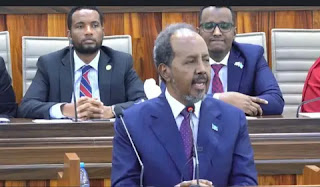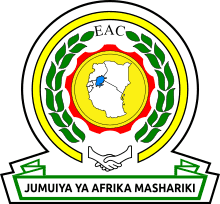A SHAMEFUL WAY TO START THE NEW YEAR: ETHIOPIA INFRINGES ON THE SOVEREIGNTY AND TERRITORIAL INTEGRITY OF SOMALIA
A SHAMEFUL WAY TO START THE NEW YEAR: ETHIOPIA
INFRINGES ON THE SOVEREIGNTY AND TERRITORIAL INTEGRITY OF SOMALIA
Ethiopia’s move to sign a Memorandum Of
Understanding, (MOU) with a regional
state in Somalia, a self-declared independent state on Somalia, is a
historical, political, and legal mistake. Given the fact that Somaliland is not
recognized by the international community as a sovereign country and remains
part of Somalia, the MOU violates the sovereignty and territorial integrity of
Somalia. Ethiopia's move to sign the MOU with Somaliland, leasing 20 Kilometers
stretch of the Somali coastline for establishing a base for Ethiopian marine
forces comes just days after the reconciliation efforts by Djibouti to
establish a roadmap for talks between the Somalia and Somaliland. The meeting
in Djibouti was attended by the president of Somalia Dr Hassan Sheikh Mohamud and
regional president of Somaliland Muse Bihi. The MOU undermines the talks
between Somalia and Somaliland and wider international efforts for peace and
security in the region. This could potentially disrupt the delicate balance of
power in the region and have far-reaching consequences for the sovereignty of
Somalia. The sovereignty of a nation is a foundational principle in
international relations, and any attempts by one country to infringe upon the
territorial integrity and autonomy of another are bound to raise concerns and
tensions. In the case of Somalia, a nation that has already faces numerous
challenges, including political instability, security issues, and economic
struggles, the MOU signed with Somaliland would further exacerbate these
vulnerabilities. This article highlights the reasons why it is shameful for
Ethiopia to have taken advantage of a country that is trying to regain its
stability with its quest to fraudulently access its ports. Somalia has been
making good progress and has most recently joined the East African Community
(EAC), a free trade agreement between member countries, notably Ethiopia is not
a member of the EAC.
- Violates the UN Charter: The UN Charter
states that each member state, regardless of its size or power, has an equal
right to sovereign independence. It also highlights the principles for not
interfering with the internal affairs of member countries. States are
expected to respect the political independence of other nations.
Therefore, since Ethiopia is a member state, it is bound by this charter,
and signing an MOU with Somaliland which is still a region of Somalia,
violates this charter.
- Violates International Law on Boundaries: Given the fact that Somaliland is still part of Somalia, access
to its ports by Ethiopia violates the principles of international law.
This is why Ethiopia should have involved the federal government of
Somalia before signing any memorandum of understanding with Somaliland.
- Violates African Union Constitutive Act: AU Constitutive Act requires the leaders in African countries
to foster a sense of togetherness, harmony, integration, and collaboration
among the inhabitants of Africa and the nations within the continent.
Hence, the move by the Ethiopian administration to sign an MOU with
Somaliland which is a region in an African country (Somalia) violates,
this act as it does not promote peace and unity in Somalia. Since the
signing on 1st January 2024, there have been demonstrations
across the country and condemnation by the current administration of
President Dr. Hassan Sheikh.
- Threatens the stability of Somalia: Somalia is on the verge of gaining political stability as it
has made significant strides under the current administration of President Dr. Hassan Sheikh which
has overseen milestones such as becoming a member of EAC, the lifting of
the arms embargo, and the relief of $5.2 billion in debt to $600 million.
However, interference by Ethiopia by signing the MOU with Somaliland
threatens this stability as it could lead to revival of Al-Shabaab. As
history does not lie, Ethiopia's entry into Somalia in 2006 with the aim
of combating the Islamic Courts Union resulted in the emergence of the
Al-Shabab, which continues to present a notable security concern. The MOU
could also lead to a regional war between Somalia and Ethiopia since
unwarranted access to Somalia territory would be perceived as a form of
aggression.
Conclusion
●
Ethiopia has a history of
having tense relations with its neighboring countries and over the years has
continued to stir violence and wage war with neighbors. For instance, Ethiopia waged war against one of its former
regions (Eretria) that had gained independence from them due to disagreements
about the exact location of the new Ethiopian–Eritrean border. There have been
all forms of natural resource-based conflicts between Ethiopia and neighboring
countries like Kenya, Egypt, Djibouti, and Sudan. Therefore, the issue of a
memorandum of understanding signed between Ethiopia and Somaliland should be
urgently addressed by the regional and international community. Somalia is on
the right path to stability under the current administration of President Dr. Hassan Sheikh and any
form of interference by the neighboring countries like Ethiopia undermines the
milestones achieved so far. In addition, the MOU signed between Ethiopia and
Somaliland violates the international laws, UN charter, AU charter and IGAD Charter and infringes on the territorial
sovereignty of Somalia. Furthermore, the presence of Ethiopia in Somalia could
give rise to extremism as happened in 2006. It is shameful that a country
(Ethiopia) that is the seat of the AU and one of ATMIS forces contributing
countries would prey on country (Somalia) that is on baby steps towards
stability. It is also dysfunctional for Ethiopia that has defaulted on their
debts to be willing to set up a maritime base in Somaliland. How would they
finance it, Ethiopia should be
sanctioned by the regional and the international community for this form of
aggression against Somalia.
By
Abdullahi M. Hassan (Abdullahi Yabarow)
@siigaale1



Comments
Post a Comment